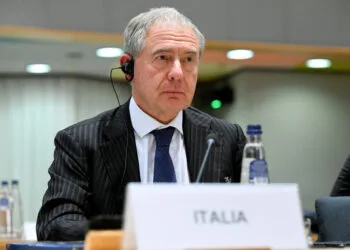Brussels – The Minister for Enterprise and Made in Italy, Adolfo Urso, goes straight down the road he outlined yesterday (Sept. 24) regarding the regulation on CO2 emissions from motor vehicles. Particularly on two points: the revision of the rules should be brought forward from the end of 2026 to the beginning of next year, and biofuels should be included among the post-2035 fuels. And, at least on the former, Rome would have the support of Berlin. On the postponement of the 2035 deadline for the final stop to internal combustion engines, however, opposition from the Italian government seems to have disappeared.
Talking to reporters at the European Parliament in Brussels on Wednesday afternoon (Sept. 25), where he went after attending an event on the future of automotive organized by the Hungarian presidency of the EU Council, the MIMIT incumbent reiterated that, based on the “reality principle,” the green deal goals related to electric mobility should be recalibrated. Because, under current circumstances, they are impossible to achieve.
The Italian government will therefore ask the Commission, “also through a non-paper (i.e., an informal document, Ed.) that we intend to present together with some European countries with whom I am talking, that the date of exercise of the review clause, already scheduled for the end of 2026, be brought forward to the first part of 2025,” the minister said, “in the absolute certainty that we cannot leave businesses and consumers for another two years in uncertainty about what to do.”
With regard to the deadline for the prohibition of production of vehicles with diesel and gasoline engines, set for the middle of the next decade, Urso listed “three conditions” under which the 2035 deadline can reasonably be maintained. First, “significant resources to enable investments that accelerate on the transition phase and enable European consumers to buy electric cars because they are no longer doing so today.” Second, “a clear vision of technology neutrality,” which “also means biofuel or hydrogen and beyond.” Finally, it is necessary to combine this energy transition “with the principle of strategic autonomy, that is, European security,” which in turn is defined by the “new geopolitical conditions that we must take note of “because “Europe is surrounded by wars.”
“If these three conditions will not be in place, and we cannot, therefore, guarantee the 2035 target, then we have to move to a subordinate solution,” he cautioned, “which is that of postponing the 2035 target to when it is all possible and sustainable.” In short, it is a matter of aligning “environmental, industrial, and security policies,” which hitherto have been separated, reducing the Green Deal to an operation of ideological environmentalism.
Urso spoke with counterparts from Austria, Czechia and Spain, who reportedly signalled “openness” to the Italian proposals. A firmer backing, however, came from German Economy Minister Robert Habeck, who “opened both to the possibility of common resources and the possibility of a clearer vision of technological neutrality.” According to the head of MIMIT, the vice chancellor also shared the need to advance the review to early 2025. The two would agree on the need, highlighted by Mario Draghi in his report on the future of competitiveness in the Union, to support European industry in the face of global competition (especially from China and the United States) through public and private investment.
The real solidity of the front of countries coalesced around the Rome-Berlin axis will be seen, for a start, at the Competitiveness Council scheduled for tomorrow (Sept. 26), where the ministers of the Twenty-Seven will discuss, among other things, the report of the former Italian premier and, precisely, the future of the single market, including for the auto sector. But will the Commission agree to reshuffle the already agreed deadlines? Until yesterday, spokesmen were expressly saying the opposite: the 2026 deadline is “appropriate,” meaning no change. But Urso expressed confidence in the possibility of dialogue with the “European centre-right government, pointing to the composition of the second von der Leyen College, which counts, among others, “14 populars, one conservative, one expression of the sovereignist government of Hungary.”
MEP and Industry Commission Vice-President Giorgio Gori (S&D/PD) met Minister Urso in Brussels today, to whom he emphasised that “the European automotive companies, which have invested more than €250 billion in the electric option, are not asking for the 2035 deadline to be postponed: instead, they are calling for European policy to accelerate the transition to electric power with investments and choices concerning all components of the ecosystem: energy sources, European production of batteries and high-tech components, raw materials, and recharging infrastructure.”
According to Pasquale Tridico, leader of the 5 Star Movement delegation, “the recipes illustrated by Minister Adolfo Urso at the European Parliament to relaunch the automobile market are not the solution and risk aggravating, rather than improving, the serious crisis that the sector is going through and the disastrous consequences for employment”. According to the MEP, “the problem cannot be tackled with tariffs on China alone or with the postponement of European targets, as Minister Urso simplistically proposes: massive public intervention is needed to support sustainable transition in the mobility sector, starting with public transport”.
English version by the Translation Service of Withub




